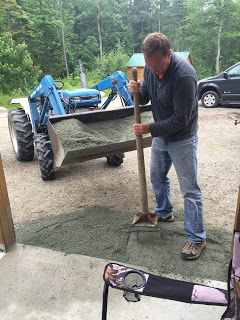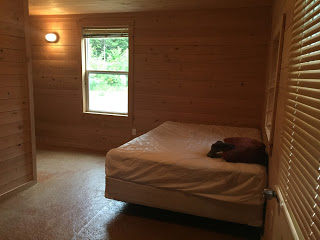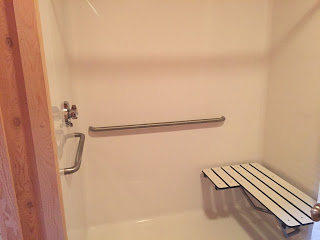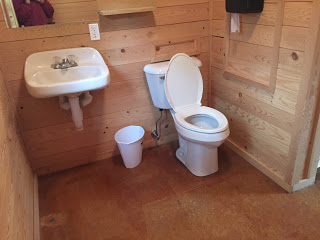Kim and I had just started dating in high school the first time I visited Hadley’s Point Campground. I was invited on her family vacation, but I had to sleep in the back of a pickup truck. No problem for a 16-year-old boy on a mission.
Kim and I, and later our kids, made many return trips to Hadley’s Point over the years until we stopped camping about the same time I began using a wheelchair.
Last year this campground added 14 cabins, two of which were advertised as handicapped accessible. These cabins had become so popular that I had to call on January 2nd, the first day they took reservations, in order to secure three nights in July.
I’m always uneasy about vacation accommodations, and this was no exception. When we arrived early on Thursday afternoon, Kim unlocked the door to our cabin, made a quick inspection, and reported to me that it looked good. I decided to see for myself. There was a slight elevation difference between the driveway and the concrete porch on the cabin. Because of the soft gravel, I got stuck on that lip. But Kim gave me a boost up onto the porch. I went inside and confirmed her assessment that the cabin looked promising.
My brother Tom used his bare hands to build a makeshift ramp out of landscaping mulch. It was a decent, interim step, but I wondered if it would hold up until Sunday.
Not long afterward, a younger man, who turned out to be the campground owner, arrived with a front end loader full of stone dust. He and the older gentleman built two nice ramps that held up for the entire stay.
I asked the obvious question. “You can’t have had any power wheelchair users rent these cabins, right?”
“Nope. You’re the first one.”
I then had a long conversation with the owner about the process he went through to have the cabins built and some of the conflicting advice he had been given about ADA compliance. I complimented him on his good-faith effort, and I helped him understand a couple of more issues, including the lack of grab bars around the toilet. He promised to fix that. He got the most important issue right by building the accessible cabins even larger than the other cabins. Most accessibility shortcomings can be fixed down the road, but “too small” is a problem that usually can’t be overcome.
If you’re a wheelchair user and are interested in these cabins, I can wholeheartedly recommend them. Just remember, when you check-in have them make sure the ramps they made for me are still in place. Below, are some pictures of the interior of our cabin.
We had a great time cooking outdoors, sitting around the campfire, and catching up with old friends in nearby Southwest Harbor. But the highlight of the trip for me was our visit to Jordan Pond. Come back tomorrow to read about that adventure.







Entertaining and illuminating as always, Mitch. You'd think by now that there would be clear and precise specifications for accessibility access, that good people like your campground owner could use. I know, from direct experience working in education in Scotland, that the UK does have such information available. Anyone (private companies and public bodies) has to apply for permission to build and the specifications have to be met before a completion certificate is issued. In the case of your campground, the owner wouldn't have been able to rent out the cabins until he had complied (he would have failed the inspection because of the ramp issue). Over here, a similar system operates with permissions etc, but the building regulations just don't seems so well defined in terms of accessibility.
Stu, the Americans with disabilities act is supposed to take care of these issues, but it does depend upon proper administration by local officials, which I think was the problem in this case.
The thought of being able to hang out in the woods is pretty darned attractive. I can't wait to hear about Jordan Pond!
There's something about getting back to nature…